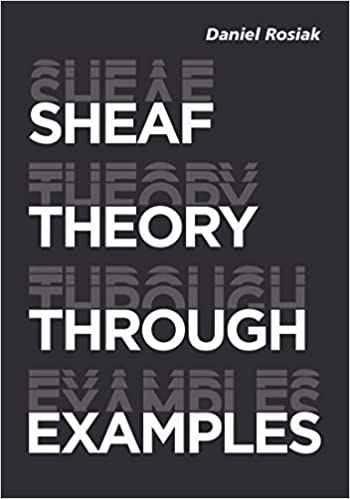
|
FreeComputerBooks.com
Links to Free Computer, Mathematics, Technical Books all over the World
|
|
- Title: Sheaf Theory through Examples
- Author(s) Daniel Rosiak
- Publisher: The MIT Press (October 25, 2022); Open Access
- License: Attribution-Noncommercial-Share Alike 3.0
- Hardcover: 454 pages
- eBook: PDF
- Language: English
- ISBN-10/ASIN: 0262542153
- ISBN-13: 978-0262542159
- Share This:

|
Sheaves are mathematical constructions concerned with passages from local properties to global ones. They have played a fundamental role in the development of many areas of modern mathematics, yet the broad conceptual power of sheaf theory and its wide applicability to areas beyond pure math have only recently begun to be appreciated.
Taking an applied category theory perspective, this book provides an approachable introduction to elementary sheaf theory and examines applications including n-colorings of graphs, satellite data, chess problems, Bayesian networks, self-similar groups, musical performance, complexes, and much more.
It seeks to bridge the powerful results of sheaf theory as used by mathematicians and real-world applications, while also supplementing the technical matters with a unique philosophical perspective attuned to the broader development of ideas.
About the Authors- Daniel Rosiak is a Research Associate at the Inamori International Center for Ethics and Excellence at Case Western Reserve University.
- Category Theory
- Geometry and Topology
- Applied Mathematics
- Graph Theory
- Algebra, Abstract Algebra, and Linear Algebra, etc.
 Similar Books:
Similar Books:
-
 New Directions in Geometric and Applied Knot Theory
New Directions in Geometric and Applied Knot Theory
The aim of this book is to present recent results in both theoretical and applied Knot Theory - which are at the same time stimulating for leading researchers in the field as well as accessible to non-experts.
-
 Quasi-projective Moduli for Polarized Manifolds (Eckart Viehweg)
Quasi-projective Moduli for Polarized Manifolds (Eckart Viehweg)
This book discusses two subjects of quite different nature: Construction methods for quotients of quasi-projective schemes by group actions or by equivalence relations and properties of direct images of certain sheaves under smooth morphisms.
-
 An Invitation to Applied Category Theory: Seven Sketches
An Invitation to Applied Category Theory: Seven Sketches
Category theory is now a powerful tool in science, informatics, and industry. This book offers a self-contained tour of applied category theory. Each chapter follows a single thread motivated by a real-world application and discussed with category-theoretic tools.
-
 Topology: A Categorical Approach (Tai-Danae Bradley, et al)
Topology: A Categorical Approach (Tai-Danae Bradley, et al)
A graduate-level textbook that presents basic topology from the perspective of category theory. Many graduate students are familiar with the ideas of point-set topology and they are ready to learn something new about them.
-
 Basic Category Theory (Tom Leinster)
Basic Category Theory (Tom Leinster)
Assuming little mathematical background, this short introduction to Category Theory is ideal for beginning graduate students or advanced undergraduates learning category theory for the first time.
-
 Category Theory in Context (Emily Riehl)
Category Theory in Context (Emily Riehl)
This book introduces the essential concepts of category theory: categories, functors, natural transformations, the Yoneda lemma, limits and colimits, adjunctions, monads, Kan extensions, and other topics.
-
 Category Theory for Programmers (Bartosz Milewski)
Category Theory for Programmers (Bartosz Milewski)
In this category theory for programmers, the author illustrates all major concepts using computer code. You are probably aware that functional languages are closer to math than the more popular imperative languages. They also offer more abstracting power.
-
 Category Theory for Computing Science (Michael Barr, et al.)
Category Theory for Computing Science (Michael Barr, et al.)
This book is a textbook in basic category theory, written specifically to be read by people in computing science. It expounds the constructions we feel are basic to category theory in the context of examples and applications to computing science.
-
 Categories, Types, and Structures (Andrea Asperti, et al)
Categories, Types, and Structures (Andrea Asperti, et al)
This book introduces Category Theory at a level appropriate for computer scientists and provides practical examples in the context of programming language design. It pursues the more complex mathematical semantics of data types and programs.
-
 Categorical Homotopy Theory (Emily Riehl)
Categorical Homotopy Theory (Emily Riehl)
This book develops abstract homotopy theory from the categorical perspective with a particular focus on examples. It helps consolidate and simplify one's understanding of derived functors, homotopy limits and colimits, and model categories, among others.
-
 Higher Topos Theory (Jacob Lurie)
Higher Topos Theory (Jacob Lurie)
This book presents the foundations of Higher Topos Theory, using the language of weak Kan complexes, and shows how existing theorems in algebraic topology can be reformulated and generalized in the theory's new language.
-
 Programming in Martin-Lof's Type Theory: An Introduction
Programming in Martin-Lof's Type Theory: An Introduction
This book focuses on the type theory developed by Per Martin-Lof. It contains a thorough introduction to the Martin-Lof's Type Theory, with information on polymorphic sets, subsets, monomorphic sets, and a full set of helpful examples.





